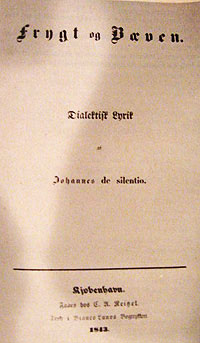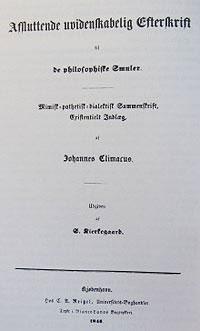Søren Kierkegaard
Søren Aabye Kierkegaard (5 May 1813 – 11 November 1855) was a Danish philosopher, theologian, poet, social critic, and religious author who is widely considered to be the first existentialist philosopher. He wrote critical texts on organized religion, Christendom, morality, ethics, psychology, and the philosophy of religion, displaying a fondness for metaphor, irony, and parables. Much of his philosophical work deals with the issues of how one lives as a "single individual," giving priority to concrete human reality over abstract thinking and highlighting the importance of personal choice and commitment.
Biography[edit | edit source]
Søren Kierkegaard was born into an affluent family in Copenhagen. His father, Michael Pedersen Kierkegaard, was a deeply melancholic man who influenced Kierkegaard's outlook on life and philosophy. Kierkegaard was educated at the University of Copenhagen, where he studied theology, but his studies also included literature and philosophy, reflecting his broad range of interests.
Philosophical Work[edit | edit source]
Kierkegaard's philosophical work spans a wide array of subjects, from the concept of anxiety, despair, and freedom to the critique of rationalism and the importance of subjective experience and decision-making. His major philosophical texts include Either/Or, Fear and Trembling, The Concept of Anxiety, The Sickness Unto Death, and Concluding Unscientific Postscript to Philosophical Fragments.
Existentialism[edit | edit source]
Kierkegaard is often cited as the precursor to the existentialist movement, though he did not use the term "existentialism" himself. His focus on the individual's subjective experience and responsibility in the face of an absurd world laid the groundwork for later existentialist thinkers, such as Jean-Paul Sartre, Albert Camus, and Martin Heidegger.
Critique of Hegelianism[edit | edit source]
Kierkegaard was a vocal critic of Georg Wilhelm Friedrich Hegel's philosophy, which he believed overstated the role of reason and neglected the individual's subjective experience. He argued that life cannot be understood through abstract philosophical systems but must be lived and experienced directly.
Influence and Legacy[edit | edit source]
Kierkegaard's influence extends beyond philosophy into theology, literature, psychology, and cultural studies. His ideas on individuality, ethics, and the nature of existence have inspired a wide range of thinkers and writers. Despite being relatively unknown during his lifetime, Kierkegaard's work gained significant attention in the 20th century and continues to be studied and admired.
Selected Works[edit | edit source]
- Either/Or (1843)
- Fear and Trembling (1843)
- The Concept of Anxiety (1844)
- The Sickness Unto Death (1849)
- Concluding Unscientific Postscript to Philosophical Fragments (1846)
See Also[edit | edit source]
This article is a philosophy-related stub. You can help WikiMD by expanding it!
Search WikiMD
Ad.Tired of being Overweight? Try W8MD's physician weight loss program.
Semaglutide (Ozempic / Wegovy and Tirzepatide (Mounjaro / Zepbound) available.
Advertise on WikiMD
|
WikiMD's Wellness Encyclopedia |
| Let Food Be Thy Medicine Medicine Thy Food - Hippocrates |
Translate this page: - East Asian
中文,
日本,
한국어,
South Asian
हिन्दी,
தமிழ்,
తెలుగు,
Urdu,
ಕನ್ನಡ,
Southeast Asian
Indonesian,
Vietnamese,
Thai,
မြန်မာဘာသာ,
বাংলা
European
español,
Deutsch,
français,
Greek,
português do Brasil,
polski,
română,
русский,
Nederlands,
norsk,
svenska,
suomi,
Italian
Middle Eastern & African
عربى,
Turkish,
Persian,
Hebrew,
Afrikaans,
isiZulu,
Kiswahili,
Other
Bulgarian,
Hungarian,
Czech,
Swedish,
മലയാളം,
मराठी,
ਪੰਜਾਬੀ,
ગુજરાતી,
Portuguese,
Ukrainian
Medical Disclaimer: WikiMD is not a substitute for professional medical advice. The information on WikiMD is provided as an information resource only, may be incorrect, outdated or misleading, and is not to be used or relied on for any diagnostic or treatment purposes. Please consult your health care provider before making any healthcare decisions or for guidance about a specific medical condition. WikiMD expressly disclaims responsibility, and shall have no liability, for any damages, loss, injury, or liability whatsoever suffered as a result of your reliance on the information contained in this site. By visiting this site you agree to the foregoing terms and conditions, which may from time to time be changed or supplemented by WikiMD. If you do not agree to the foregoing terms and conditions, you should not enter or use this site. See full disclaimer.
Credits:Most images are courtesy of Wikimedia commons, and templates, categories Wikipedia, licensed under CC BY SA or similar.
Contributors: Prab R. Tumpati, MD






